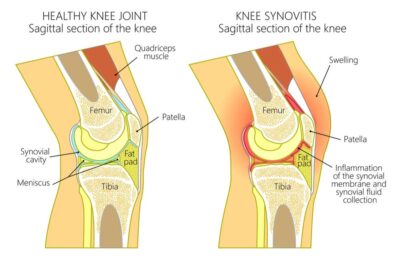Joint Inflammation Specialist

Do you have swelling in or around the knee? Are you experiencing pain, especially when moving or joint stiffness that is worse in the morning? If so, you may have synovitis or joint inflammation in the knee. Synovitis can affect patients with a history of gout or arthritis. Knee inflammation and synovitis of the knee specialist, Doctor Riley J. Williams provides diagnosis as well as surgical and nonsurgical treatment options for patients in Manhattan, Brooklyn, New York City and surrounding areas who are experiencing symptoms of synovitis or knee inflammation. Contact Dr. Williams’ team today!
What is synovitis of the knee?
Synovitis of the knee occurs when the synovium, the connective tissue that lines the joint space, becomes inflamed. Synovium, or the synovial membrane, is a soft tissue that covers the joint cavity and nearby tendons. The synovium produces synovial fluid, the liquid that helps reduce joint friction and helps to cushion the bone ends. Synovitis of the knee occurs when the synovial membrane becomes irritated and swells, causing discomfort or pain during joint movement. This condition may be caused by an underlying condition, such as arthritis, or by overuse of the joint. Overuse synovitis of the knee is seen most frequently in athletes or individuals with high-action activities or jobs. Dr. Riley J. Williams, an orthopedic knee specialist, is extremely experienced in diagnosing and treating patients with synovitis in the knee. He can help patients in Manhattan, Brooklyn, New York City, NY and surrounding areas recover from synovitis of the knee.
What causes joint inflammation in the knee?
Joint inflammation occurs when there is swelling, redness, and pain in the knee joint. Knee inflammation may be caused by infection, arthritis, autoimmune disease, gout, or a recent traumatic injury. Joint inflammation is related to synovitis of the knee: Inflammation is a more general term describing the pain and swelling patients experience in the knee, while synovitis is inflammation specifically to the synovial membrane.
What are the symptoms of synovitis or knee joint inflammation?
Dr. Williams’ patients with synovitis typically report the following symptoms:
- Redness
- Swelling
- Pain, especially while moving.
- Joint stiffness that is worse in the morning.
- Warmth in the knee.
- Water on the knee
How is synovitis or knee joint inflammation diagnosed?
Dr. Williams will typically ask his patients about their recent medical and physical history, including any history of arthritis or gout, the patient’s activity level, and if there have been any recent injuries to the knee or leg. Next, Dr. Williams will perform a physical examination, checking the knee for redness, swelling, and warmth. He will test the range of motion of the knee, and the presence of any pain or tenderness to the touch. Often, Dr. Williams will request an MRI scan to confirm his diagnosis.
Can synovitis be treated without surgery?
Synovitis can be treated without surgery. In more mild cases, the symptoms may lessen without treatment. It is recommended that affected patients rest, apply ice, apply compression, and elevate the joint. Physical therapy can also help to restore range of motion in the knee and allow for rapid natural healing of the knee joint. In more moderate cases, synovitis, or knee joint inflammation, may be treated with anti-inflammatory medications (NSAIDs), steroid injections, or other biologic joint injections. These injections can help decrease swelling, inflammation, and can manage pain. Steroid injections can be extremely helpful in managing the symptoms of synovitis; however, it is not a cure.
How is synovitis treated surgically?
If conservative treatments fail to decrease the patients’ symptoms, Dr. Williams may perform a knee Arthroscopy to remove inflamed synovium; this procedure is called a synovectomy. This type of procedure is minimally invasive and highly effective. After this surgery, patients will start physical therapy to regain flexibility and movement in the joint. Dr. Williams’ patients are generally able to return to their normal activities within a few months of the surgery.
For more information regarding inflammation of the knee or knee synovitis and the treatment options available, please contact the office of Riley Williams, MD, knee specialist serving Manhattan, Brooklyn, New York City, NY and surrounding areas.
Locations
610 W 58th Street
New York, NY 10019
148 39th Street, 7th Floor
Brooklyn, NY 11232



